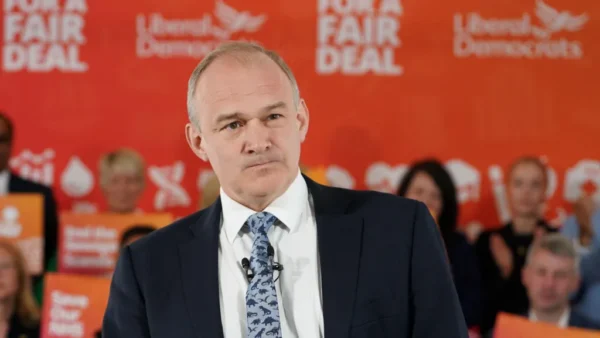
The National Health Service (NHS) has long been a cornerstone of British public life, embodying the principles of universal healthcare and equitable access to medical services. However, as pressures on the NHS continue to mount, the Liberal Democrats are making a bold call for action. In a recent statement, Lib Dem leader [Name] has warned that unless substantial investments are made in the NHS, the service could face irreversible decline. This urgent appeal comes amid growing concerns about the future of the NHS, the quality of care, and the well-being of patients and staff.
The Current Crisis
The NHS has been grappling with a series of challenges in recent years. The COVID-19 pandemic placed unprecedented strain on the healthcare system, exacerbating existing issues such as staffing shortages, long waiting times, and financial pressures. While the pandemic highlighted the resilience and dedication of NHS staff, it also underscored the urgent need for a robust and well-funded healthcare infrastructure.
Recent reports have shown that waiting times for treatment are at record highs, with patients facing delays for routine procedures and emergency care. The strain on the system has led to widespread concerns about the impact on patient outcomes and the overall quality of care. Additionally, staff morale has been tested as healthcare professionals continue to work under challenging conditions, often without the support and resources they need.
The Lib Dem Call for Investment
In response to the crisis, [Name], the leader of the Liberal Democrats, has issued a stark warning: invest in the NHS now or face a future of decline. The Lib Dem leader’s call to action is based on several key arguments:
- Addressing Funding Shortfalls: [Name] emphasizes that the NHS is facing a significant funding gap that needs to be addressed to maintain and improve services. Without adequate investment, the ability of the NHS to provide timely and effective care will continue to be compromised. The Lib Dem leader advocates for increased public spending on healthcare to ensure that the NHS can meet the needs of an aging population and a growing demand for services.
- Improving Staff Conditions: The well-being of NHS staff is critical to the functioning of the healthcare system. [Name] has highlighted the need for better pay, improved working conditions, and support for mental health. Investing in staff is not only a matter of fairness but also essential for retaining skilled professionals and ensuring that patients receive high-quality care.
- Modernizing Infrastructure: The Lib Dem leader argues that significant investment is required to modernize NHS facilities and equipment. Outdated infrastructure and technology can hinder the efficiency and effectiveness of healthcare delivery. By investing in modernization, the NHS can improve patient outcomes and streamline operations.
- Reducing Health Inequalities: The NHS plays a crucial role in addressing health inequalities, but funding cuts and resource constraints have exacerbated disparities in healthcare access and outcomes. [Name] advocates for targeted investment in underserved communities to ensure that all individuals receive equitable care.
Reactions from Other Parties and Stakeholders
The Lib Dem proposal has elicited a range of responses from other political parties, healthcare professionals, and the public:
- Government Response: The ruling party has acknowledged the challenges facing the NHS but has defended its record on healthcare investment. Government officials argue that significant resources have been allocated to the NHS in recent years and that ongoing efforts are being made to address the issues. However, critics have questioned whether these measures are sufficient to address the scale of the crisis.
- Healthcare Professionals: Many healthcare professionals support the Lib Dem call for increased investment, echoing concerns about staff shortages, burnout, and inadequate resources. Unions and professional bodies have expressed support for measures that would improve working conditions and patient care.
- Public Opinion: Public opinion is mixed, with many people acknowledging the need for more investment in the NHS. However, there is also concern about the potential impact on other public services and the overall fiscal implications of increased spending. The debate over healthcare funding remains a prominent issue in public discourse.
Potential Impact of Investment
If the Lib Dem proposals were implemented, the impact on the NHS could be substantial:
- Enhanced Care Quality: Increased investment would likely lead to improvements in patient care, including reduced waiting times, better access to treatments, and higher overall standards of service. This could result in better health outcomes and increased patient satisfaction.
- Staff Retention and Morale: Improved pay and working conditions would help retain experienced staff and attract new talent to the NHS. This, in turn, would address some of the workforce challenges and contribute to a more stable and effective healthcare system.
- Modernized Facilities: Investment in modernizing infrastructure and technology would enhance the efficiency of healthcare delivery, reduce operational costs, and improve the patient experience.
- Addressing Inequalities: Targeted investment in underserved areas could help reduce health disparities and ensure that all communities have access to high-quality care.
Moving Forward
The debate over NHS investment is likely to remain a key issue in upcoming political discussions and elections. The call from the Lib Dem leader highlights the urgency of addressing the current crisis and the potential benefits of increased funding for the NHS. As the situation evolves, it will be important for policymakers, healthcare professionals, and the public to engage in constructive dialogue to find solutions that ensure the future sustainability and effectiveness of the NHS.
In conclusion, the warning from the Lib Dem leader serves as a powerful reminder of the critical importance of investing in the NHS. Without significant and sustained investment, the healthcare system risks declining in quality and effectiveness, ultimately impacting the well-being of patients and the dedicated staff who serve them. The future of the NHS depends on making informed and proactive decisions that prioritize the health and care of the nation.


